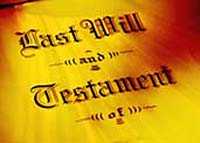

The Sabetha (KS) Herald’s recent article, “Understanding the estate planning process,” says that both notions may be wrong because your level of wealth and the ultimate tax consequences of your estate take a back seat to the planning and care of your family and other heirs.
A revocable trust allows you to control the distribution of your assets and possessions, as well as designate guardians for your children or plan care for other dependents. This trust typically has a “pour over will” prepared to “fund” the trust with any assets not titled in the trust while you are alive or designated to pass to the trust (or directly to beneficiaries) at your death. Your estate planning attorney can create this for you and assist you with a complete analysis of your current estate by reviewing your financial position as of today and analyzing your family’s needs in the future.
An experienced estate planning lawyer will help you plan for a family member who has special needs or requires medical attention, prepare for the cost of a college education when your children reach that age and determine how estate taxes may impact your assets as they are currently held. Disclosing relevant information to your estate planning attorney will help you develop an estate plan that will properly provide for your family’s needs.
In order to conduct a complete and thorough estate analysis, your attorney will ask for all materials involving your current or future income, property ownership, insurance and any legal arrangements already in place. In addition, you’ll need to inform him or her about all of your retirement benefits and plans: Social Security, IRAs, pensions and profit-sharing plans, investments, certificates of deposit, real estate, life insurance policies you own (as well as policies you have on others), beneficiaries, other trust agreements and your will.
Along with this, bring a list of your current and anticipated debts—like mortgage and loan balance, real estate liens, taxes, consumer debts and estimates on funeral costs and estate settlement fees.
Once all of this information is ready, your estate planning attorney can start a complete analysis that will form the basis for a rock solid estate plan.
Reference: The Sabetha (KS) Herald (August 9, 2016) “Understanding the estate planning process”


